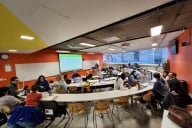You have /5 articles left.
Sign up for a free account or log in.

Maria Stavreva/digitalvision vectors/getty images
How do midlevel academic administrators respond to social crises -- events that are not of or by our unit in particular but demand our attention because they affect our community so strongly? As someone immersed in diversity, equity and inclusion issues at my university, which has had nationally infamous controversies over its Confederate statue and its fall semester reopening, I’ve faced this question many times over recent years.
The past weeks, in particular, have put my leadership practices to the test. I am the inaugural director of the Asian American Center at the University of North Carolina at Chapel Hill. I was appointed last July, and we officially opened during the pandemic in September 2020. On Wednesday, March 17, the day after the Atlanta shootings that killed eight people, six of whom were of Asian descent, I had an early-morning meeting. During it, I received a message from the chief of campus police asking to up the security on the Asian American Center building. That was when I knew what my day would be like. And it wasn’t a day but two weeks of crisis response. Here’s what I’ve learned.
Define your role. The greatest lesson of this type of crisis leadership is that it isn’t administrative; it’s moral and emotional. The center’s constituents -- Asian Americans and allies -- are looking to me and the center for education, clarity, community and support. They also want to see the university, which is to say the highest levels of administration, take action. It’s part of my less visible labor to do the advocacy for that behind the scenes.
I’ve learned you should surround yourself with advisers who will support you in your mission and your leadership. If I didn’t know my responsibility to the community, my student activists-turned-volunteers would never let me forget it. It was at their prompting that, in early March, I issued an explicit statement on the surge of anti-Asian violence. (I’ve also mentioned it in pretty much every director’s update I’ve sent out.) It was also important that the university respond, and I brought in the voices who needed to be at our community vigil, including the chancellor.
Have a crisis response plan. Know whom you will turn to and what procedures you want to follow. I decided early this year that I would issue director’s letters rather than statements on behalf of the center -- a small but meaningful difference that allows me the speed and flexibility to bypass committees or other stakeholders.
You’ll confront dozens of decisions. Who decides if a crisis is a crisis? If you are making a statement, how will you reach consensus? What types of actions can your unit take that are part of your core mission to make that statement meaningful? Whose job will it be to follow through? What gets put on hold when a crisis comes around? Whom should you be actively reaching out to in the community, and who will handle all the public communications? Who fulfills news media requests, particularly if they are specific to your community or area of scholarship? You may find yourself essentially creating a small in-house speaker bureau, but often your university’s communications office can help.
Rely on your relationships. Do unto others as you will need them to do unto you. The health of your unit in both short-term and long-term crises depends on networks of strong collaborators. From small favors to long-term partnerships, both personal and professional, you will want them all when a crisis rolls around.
I could never have pulled off the immediate Wednesday night response without partnering with the community organization, North Carolina Asian Americans Together (NCAAT), that I have worked with for years -- a relationship that’s been a blend of the personal and professional. At 2 p.m. on March 17, I was on the phone with the organization’s executive director, Chavi Koneru, roughing out a plan for a virtual vigil at 7 p.m. Thinking out loud, I said, “We need a performance or something … I know an opera singer.” By 2:20 p.m., I had a singer lined up. Back in the fall, I had noticed that a colleague had shared the Facebook video of an Asian American music student competing for a free master class. I asked if she would like me to share it on my center’s website. (We did, and she won!) That small gesture -- an extra few minutes and messages I didn’t have to bother with -- built a short-term relationship that I could tap into at a meaningful moment. In the same way, our relationship of years allowed Chavi and me to successfully plan our first joint event.
Have your ask ready. During crisis situations, messages with “Let me know what I can do” or an overt “How can I support you?” may flood your inbox, especially if you’ve built strong relationships all over campus. I cannot stress enough the need to have a long-term ask ready -- one that will best serve your goals.
In my case, those goals are to amplify the center’s work: promote it, advocate for it to be resourced properly, attend events. I’ve also added another one: to hire more Asian American studies faculty members to help with the educational work that I’m being personally asked to do in the wake of these tragedies. And if the messages that you receive just say “I’m thinking of you” and fail to ask for action items, send those suggestions along anyway with a thank-you note. (You will be sending thank-you notes for days.) Even if those people don’t take direct action, they will be aware of the information and can mention it when they are in the room where decisions are being made.
Another key lesson for me was to be more aware of short-term needs, because your crisis response will get too busy and fast-paced for you to ask for help midway through. A colleague had offered staff support, and I should have asked several faculty allies at the beginning of the day to stand by to help with tasks as simple as sending the vigil announcement out on Listservs.
Think short and long term. People who are feeling anxious or unsafe take comfort in knowing that someone is working on something. If I have a regret, it’s that I didn’t push out some kind of announcement to stand by for a possible virtual vigil immediately. It would have helped more people know about it in advance. At the same time, I’m glad that I released a statement as quickly as I did. It was important to the Asian American community, and it paved the way for a much broader campus response.
The long-term impact will be twofold. Half of it will be thrust upon you by increased requests and proposals for programming, partnership, consultations, statement review and more. The other half will come out of your own desire to leverage the sudden surge of interest and awareness into meaningful structural change. It will be extremely difficult, both emotionally and strategically, to say no. Here’s where having a clear sense of your unit’s priorities and resources can help you to decide how to respond to each proposal.
Once you get past the initial crisis and the waves of adrenaline, it’s a moment to reinforce your physical, emotional and work-life boundaries. Listen to your friends and family to help you set limits, and remember that you can’t do the work if you’re not healthy in body and mind.








